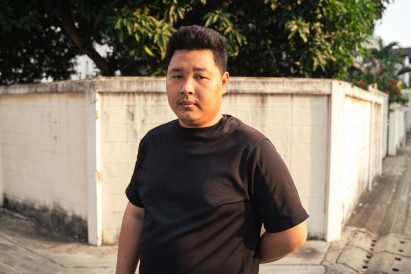‘Tawan’ and ‘Bam’ continue to fast and refuse to accept release until all colleagues freed

Sitthichok Sethasavet, a hunger-striking political activist who is appealing his royal defamation conviction, has been granted bail, Thai Lawyers for Human Rights (TLHR) said on Friday.
The court decision followed the approval of bail earlier this week for Tantawan “Tawan” Tuatulanon and Orawan “Bam” Phuphong, who remain in serious condition in Thammasat University Hospital. They have declined to accept bail and say they will continue their fast until eight other detained activists are released.
Sitthichok, a food delivery rider, was found guilty on Jan 17 of defaming the royal family, arson, destruction of property and violation of the Emergency Decree. He was sentenced to two years and four months in prison.
He was found to have set fire to a portrait at a royal ceremonial arch in Bangkok during a protest on July 18, 2021. He has been detained pending an appeal. He maintains that he did not start the fire and was in fact pouring water on it to try and put it out.
According to TLHR, the Supreme Court on Friday accepted the argument of the defendant’s lawyer that his prison sentence was not severe, he has previously been granted bail, and is not a flight risk. It approved bail with a surety of 130,000 baht.
Sitthichok is also in Thammasat University Hospital, where he has been refusing food since Jan 18 but taking water. He has lost about nine kilogrammes, his lawyer says, and remains weak. It is not known yet whether he intends to accept the bail terms or remain on hunger strike.
Ms Tantawan, 21, and Ms Orawan, 23, are facing royal defamation charges under Section 112 of the Criminal Code for taking a public poll last year about royal motorcades.
They went to court on Jan 16 to request the revocation of their bail as a gesture of solidarity with other detained colleagues. They began their hunger strike two days later.
The three hunger strikers are demanding the right to bail, the release of all political prisoners and the abolition of the lese-majeste and sedition laws.
In a related development, Asean Parliamentarians for Human Rights (APHR) on Friday urged the Thai government to listen to the demands of Ms Tantawan and Ms Orawan, and do everything they can to save their lives.
The group said it also would like to invite members of the Thai Parliament and relevant authorities to open a debate on amending the “draconian” lèse-majesté law, which carries prison terms of up to 15 years, and under which anyone can lay a charge against anyone else.
“It is tragic that these two young women feel that they have to put their lives at risk to fight for their beliefs,” said Kasit Piromya, a former Thai foreign minister and board member of APHR.
“Whatever one may think of their ideas, they should be allowed to express them freely, as it would happen in a truly democratic country, and not amidst a climate of repression that leads to such extreme ways to voice dissent. Right now, the first priority should be to save their lives, but it is also crucial to initiate a candid debate on their demands.
“A thorough revision of the lèse-majesté law will help to democratise Thailand, but will also benefit the monarchy itself, as an open debate of its role in modern Thailand is more necessary than ever,” added Mr Kasit.
As of the end of January, TLHR said it had recorded 1,890 people prosecuted for political participation and expression since the beginning of the Free Youth pro-democracy protests in July 2020. At least 228 are facing lese-majeste (royal defamation) charges and 128 have been charged with sedition.
Of all the people charged, 284 are aged 15 to 18 years and 41 are under 15 years old.
The longest detention period that the group knows of reached 300 days as of Saturday for two men.

